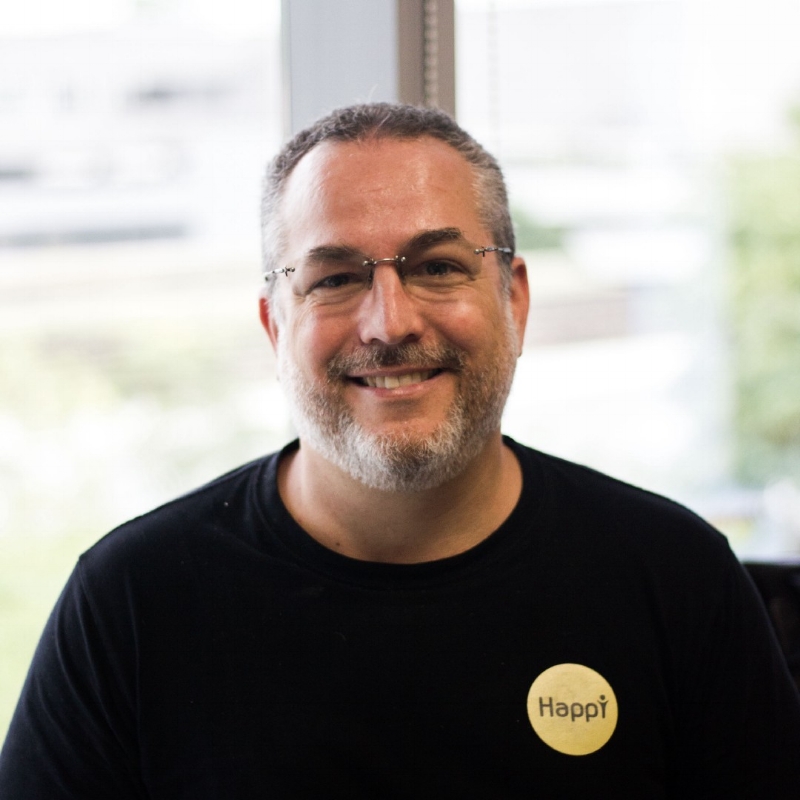Happi’s Greg Lipper on his entrepreneurial journey, and marketing in the new millennium
Greg Lipper, Happi
As all good things go, it started with an idea: What if we let people use their opinions as currency to win prizes and support causes?
The idea turned and churned in Greg’s head until one day he blurted it out at a dinner party where people were discussing the power of Google’s algorithms identifying and tracking people. Greg said, “Yeah, but an algorithm can’t inspire you, can’t bond with you, can’t make you trust it.” A Google executive asked how Greg could do that and he blurted out the idea for Happi. The rest of the discussion focused on implementation. By the end of the dinner, all encouraged Greg to do it and a week later one of them put a cheque in his hand for seed capital.
Available on the Apple Store and on Google Play, the Happi application is incredibly addictive. In exchange for survey participations, Happy contributes a donation to the cause of charity group of the users choice. Concurrently, users also stand a chance to win attractive prizes with each completed survey, and we do mean attractive — just ask the lady who won a pair of platinum Coldplay tickets in the Philippines. “She ‘smiled at’ (selected) the product 275 times,” laughed Greg, “She must have really wanted those tickets!”
Behind the straight talking self-deprecating humour lies an unbreakable fortitude that Happi’s Chief Happiness Officer has gleaned from the past mistakes made in his three-decade-long career as an entrepreneur. “Have confidence, energy, and curiosity. Don’t let the fear of failure hold you back, as you need the resilience to know that failure and rejection are all part of the journey”. With interactions come wisdom, and with past experiences even more so. Greg’s entrepreneurial journey offers these virtues in abundance.
MILLENNIALS — SAVVY MARKETERS’ PRIMARY FOCUS
Millennials are the largest generational group since Baby Boomers, and they are fast becoming the largest consumer group. Any brand that’s interested in the life-time value of a customer should have an interest in understanding and conversing with consumers of that age. Facebook has proven that one can build a successful business simply by targeting these generational groups. Happi, like Facebook, is beginning with a focus on this demographic and, again like Facebook, will reach older and younger people as it grows.
UNDERSTANDING MILLENNIALS AND THEIR HABITS
We implemented a survey for a technology client, where one of the factors examined was self-esteem. The self-esteem levels were shockingly low at Singaporean universities, with 60% of students believing that they have no worth at all, and 40% of them reacting with surprise when they succeed in life. That says a lot about the amount of pressure put upon young Singaporeans. These are students in leading universities, but over half of them are showing little self-worth. That was a little shocking!
DATA — THE GATEWAY TO UNDERSTANDING EMERGING MARKETS
Brands that survive in the next 10 years will have 50% of their consumption coming from consumers that they don’t know today…and those consumers won’t come from London, Paris or Boston. They will come from the developing world. So, that’s where Happi focuses: Helping brands understand, engage and converse with young consumers in the developing world.
ALWAYS BE OPEN TO CHANGE
You don’t know what business you’re in until you can write down the specific profile of a person who will choose your offering over existing alternatives, why they will choose yours, and how much time and money it will take you to reach how many of those customers. You won’t have those answers when you begin. That’s fine. Be prepared to adapt your perspective of your offering, go to market strategy, and target customer as you go. Your business will evolve and that’s natural. You shouldn’t wait till you have all the answers figured out before you go for it. However, if you find that you’re constantly pivoting and changing your business every other week, you should be honest with yourself about whether you really have a unique and defendable competitive advantage.
FALL DOWN SEVEN TIMES, GET UP EIGHT
Nana korobi ya oki, which means fall down seven times, stand up eight. Anything can knock you down, only you can get yourself back up. All you can control is how you react to what happens to you. Most people think that entrepreneurs are risk-takers, which isn’t true. We are highly risk-averse. We just think we are safer when we are in control... Employment offers the illusion of security. Entrepreneurship offers the illusion of control. Both are illusions, but entrepreneurs generally find more comfort in the illusion of control than the illusion of security. To me, that’s what getting up the eighth time is about. Maintaining control of your destiny.
Discover Happi and get it at the Google Play or Apple store.

